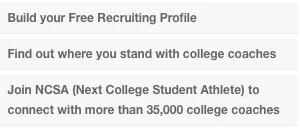Cothron Falls Into NCAA/NJCAA Catch-22
Gary Parrish of CBSSports.com published the story of Luke Cothron. After being ruled a nonqualifer but enrolling at UMass anyway, Cothron went back home to Alabama, but was convinced to come to the University of New Orleans and play basketball for a semester. He played six minutes in a game, but shouldn’t have for a variety of reasons:
- He hadn’t been granted a transfer waiver or qualified for an exception.
- He did not enroll full-time at UNO. In fact he did not enroll in any classes at all.
- He was still a nonqualifier in his first year in residence.
To be fair, UNO’s situation at the time was unique. In the aftermath of Katrina, the school was transitioning to Division III, a transition it abandoned last year to stay in Division I. Whether he qualified for an exception to the transfer rules and whether his nonqualifier status mattered would be confusing questions to even seasoned compliance professionals, not to mention any basketball coach.
But what’s very clear is that Cothron was not enrolled full-time and should never have been allowed to practice or play. So when his current coach Steve Forbes says he’s “never seen a more ludicrous decision by a compliance director and a coach than the one New Orleans initially reached,” I’m inclined to agree. That was a major mistake.
Blaming this on that individual poor decision is easy. But Luke Cothron is stuck because of NCAA policy. Because of that one game and his season at the College of Southern Idaho mean Cothron’s junior college eligibility is up. And the NJCAA cannot give him the year back which he used at UNO.
Cothron qualifies for an NCAA waiver, specifically a Season-of-Competition Waiver for Competition While Ineligible. Essentially this is a version of the same waiver that Tim Abromaitis got, but it does not carry a 2-for-1 penalty. But Cothron cannot file the waiver, an NCAA member institution has to. And UNO has not been willing to help.
The NCAA has to find a way to work directly with student-athletes in cases like this. It will be slower and more painful and will require the NCAA be willing to set and enforce deadlines to get information from schools, like eligibility records from UNO and statements from the coach and compliance director at the time. But between leaving kids like Cothron out in the cold and delays in cases like Shabazz Muhammad’s, the problem needs attention.


